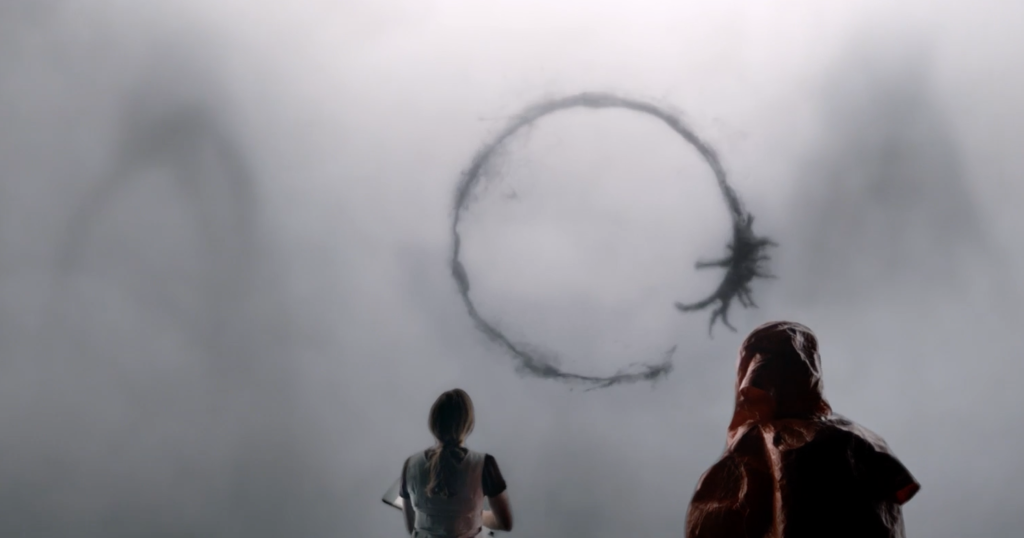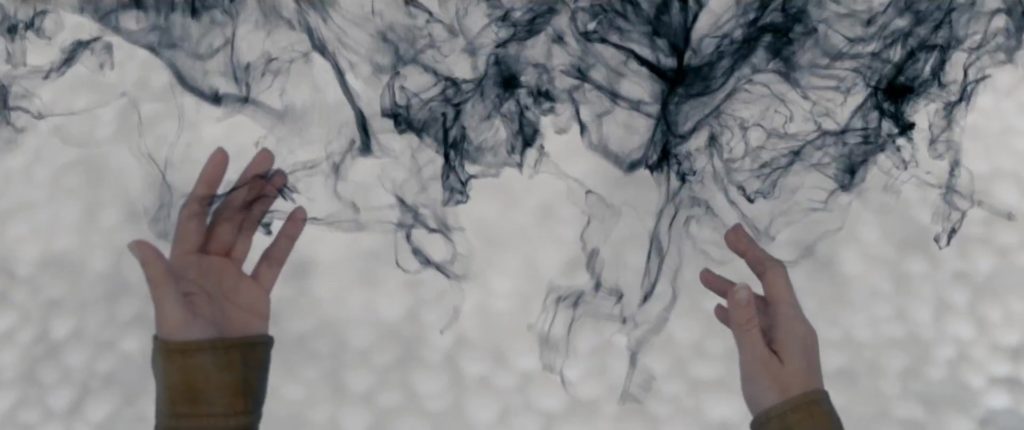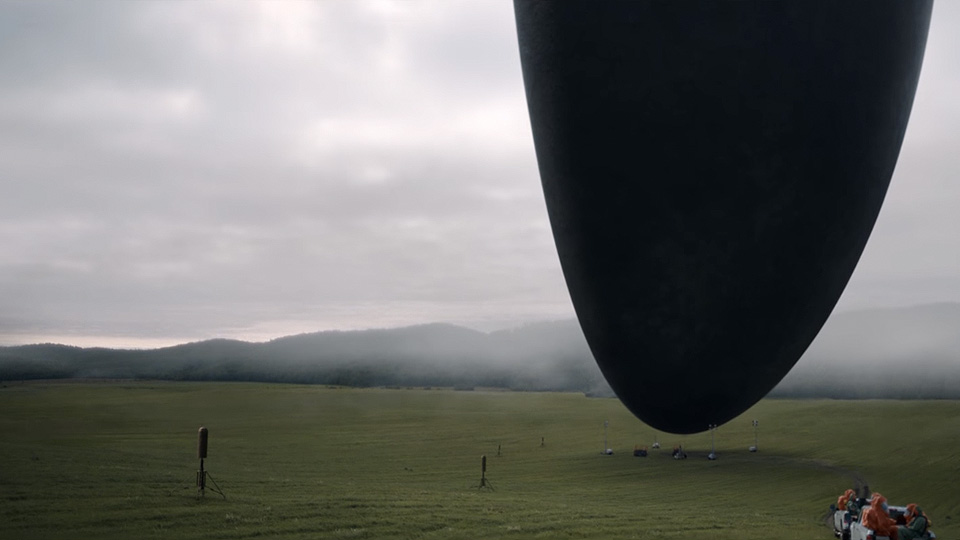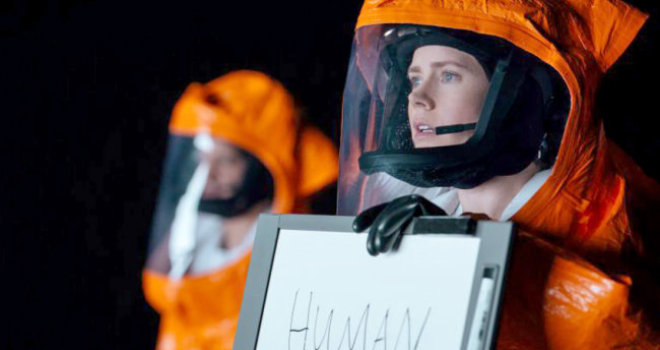It is always exciting, and fun, to speak with ERIC HEISSERER. Creative and inventive, he is not only a wordsmith, but superb storyteller, filled with unabashed enthusiasm for his work and the project at hand. Fresh off the success of the supernatural horror film “Lights Out“, with his latest screenplay for ARRIVAL, Heisserer not only adapts the award-winning novella by Ted Chiang, “Story of Your life”, but explores and expands on themes personal to him.

When enormous football-shaped alien vessels arrive at 12 locations around the globe, it falls to linguistics professor Louise Banks and physicist Ian Donnelly to “make contact” with the extraterrestrials. As communications between men and countries ceases, and the world is on the brink of instigating an interspecies galactic war, the future of mankind lies in Banks’ ability to communicate and ascertain who these aliens are and specifically, what is it they want.
Given that ARRIVAL is about communication and linguistics, the language of the Heptapods was a key component to both story and visuals. I spoke exclusively with Eric about ARRIVAL, and importantly, creating the Heptapod language, the genesis of which undoubtedly started with Heisserer’s own upbringing thanks to his academic father and his studies of linguistics.

How much of your writing of this script would you say is influenced by your upbringing with your dad and linguistics and languages?
A lot more than I realized at first. I had a real connection to the character and to what she was going through because I had seen it happen in my own father. The way that I think Louise had been sidelined or marginalized in her career, not only because she was a woman but because she was an academic, I’d seen happen in academics in my own father’s line of work and the frustration there of ‘Why don’t they listen to me?’. That just came out! [laughing] That just came out! There’s a moment at one point where I think Louise says to [Michael] Stuhlbarg’s Agent Halpern, “Why do I have to keep talking to him?” and that’s a little bit of my dad, a little bit of my upbringing; when the people who knew what was best for either the students or a department or whatever were often overlooked and someone from Congress basically would come in and say “No! We’re doing this.”

Playing off your experiences with your dad, you created this alien language, the Heptapod language. How do you create a Heptapod language?
[laughing] I at least started the fire for somebody else and sure enough, Denis had some thoughts. . .putting people together to build this team up and take the prototype that I designed in the script itself and flesh that out and make something more of it; knowing the things that I imparted to Denis that were important to me which were that it remain circular because that’s a way to express something that doesn’t have a start or an end and has non-linear sensibility to it. I am not a linguistics person or a creator or a brand new language of my own and yet I was forced to do something very graphical and try to get the ball rolling for that.
There’s a real language. . .The scene that diagrams out the Heptapod logogram that shows all the words and whatnot? All that is real. First of all, Stephen Wolfram. A famous British physicist, he does a piece of software called Mathematica, and we used some of that, and we integrated that with the language. There are 100 unique logograms that all have behavior and traits that you can parse out. There was a real analysis, is what I’m saying; that was real online analysis that we did for a real language. That wasn’t just a series of graphics and stuff that we just tied together for some sort of fun little montage. It’s pieces that were working. The things that [Louise] uses as elements to build logograms later on with her little tablet were all stuff that came from the construction of these 100 unique logograms and their purposes. We did a whole lot of work for just a handful of seconds of screen time.

Based on the award-winning novella “Story of Your Life” by Ted Chiang, it fell to you to take the bold ideas and themes of Chiang and adapt them for the big screen. An approximate six year journey for you from script to screen, was it difficult to distill that from the book and really bring it to life with a full screenplay?
It was. Especially since the message Ted [Chiang] shows at the end in the short story and the message that I wanted to convey were different. We diverged there. The story is more about Louise embracing the inevitable and that determinism and predestination is far more the path that she takes, so there’s not a choice in her life the way I wanted it to be here. I found it far more profound and emotionally resonant if we saw Louise aware of what the future was and then made it a conscious choice to continue that path; to make the same decision to have Anna again. And I think part of that is I am just far more into free will and the other part is that this is a movie and a story that has huge themes on consequences of actions and how miscommunication is often the source of so many problems, the consequences of which that can be far-reaching and wide and last for a long while. And the response is so immediate these days, so immediate. It was really important to me to have a character who saw the greater benefit of the good and the effect that these choices would have on the rest of the world. Maybe that’s why the Heptapods felt so confident in humanity in the first place. The person they really connect with when they show up here is a woman who chooses life. So, yeah. There was a lot there. It was difficult to get there but it was important at the same time.

How collaborative was this experience for you with Denis Villeneuve? Coming off of HOURS as writer/director, on your own, now you’re working with somebody as precise and visionary as Denis. What was that collaboration like, especially since Ted’s book, your script, then went into Denis’ hands?
It was completely lovely. It was just the best synthesis of hearts and minds. He had so much that I could learn from in the way that he approached his fascination with procedure, his fascination with details. He knew that the more authentic he made the environment for these characters, the more you bought into their own experiences. I can’t tell you how much added expense it was to have, say, the vehicle showers outside the camp for when the pick-ups returned and got a nightly bath. Like, how many times they had to run for that and make that all built out. It’s barely in the movie and yet our actors were aware of it, the other cast was there, everybody had a sense of authenticity about it that permeated the rest of the film. I would say also, he worked so hard to understand every page. So many directors want to put their own subtext into something or assume through ego that they understand a script already. Everybody has a different vocabulary of genre and just screenplay reading in general. To have Denis just sit down with me with a cup of coffee and say, “Alright. 27. What’s going on here? Tell me. What’s this line? What is this?” Sometimes it’s an American expression that he’s not familiar with or sometimes it’s some subtext that he goes, “Ahhh” and he writes something down and sometimes it’s, “I don’t know what that is” and he goes “Oy.” And I’m like, okay. That’s how it works.

Through working with Denis, what did you learn about directing that you can take with you into your next project?
I learned a lot. Where do I start because it’s a great question. Well, how smart it is to ask a whole bunch off questions. Ask questions of people who are much better at their job than you are. And make sure that you know how to properly and best use them for the good of the movie. Stay curious. The more that you ask others what they see in this, the more you can help course correct or guide the ship to make sure that everyone is making the same movie. That’s the thing I think Denis is so good at it. He’s almost preternaturally good at making sure that everybody is making the same thing. You can feel that on set. You can feel it all the way into the process where he can explain why every little decision was made or he can ask you what’s the best way to make something like this happen. There’s something nurturing about that. I love it.












